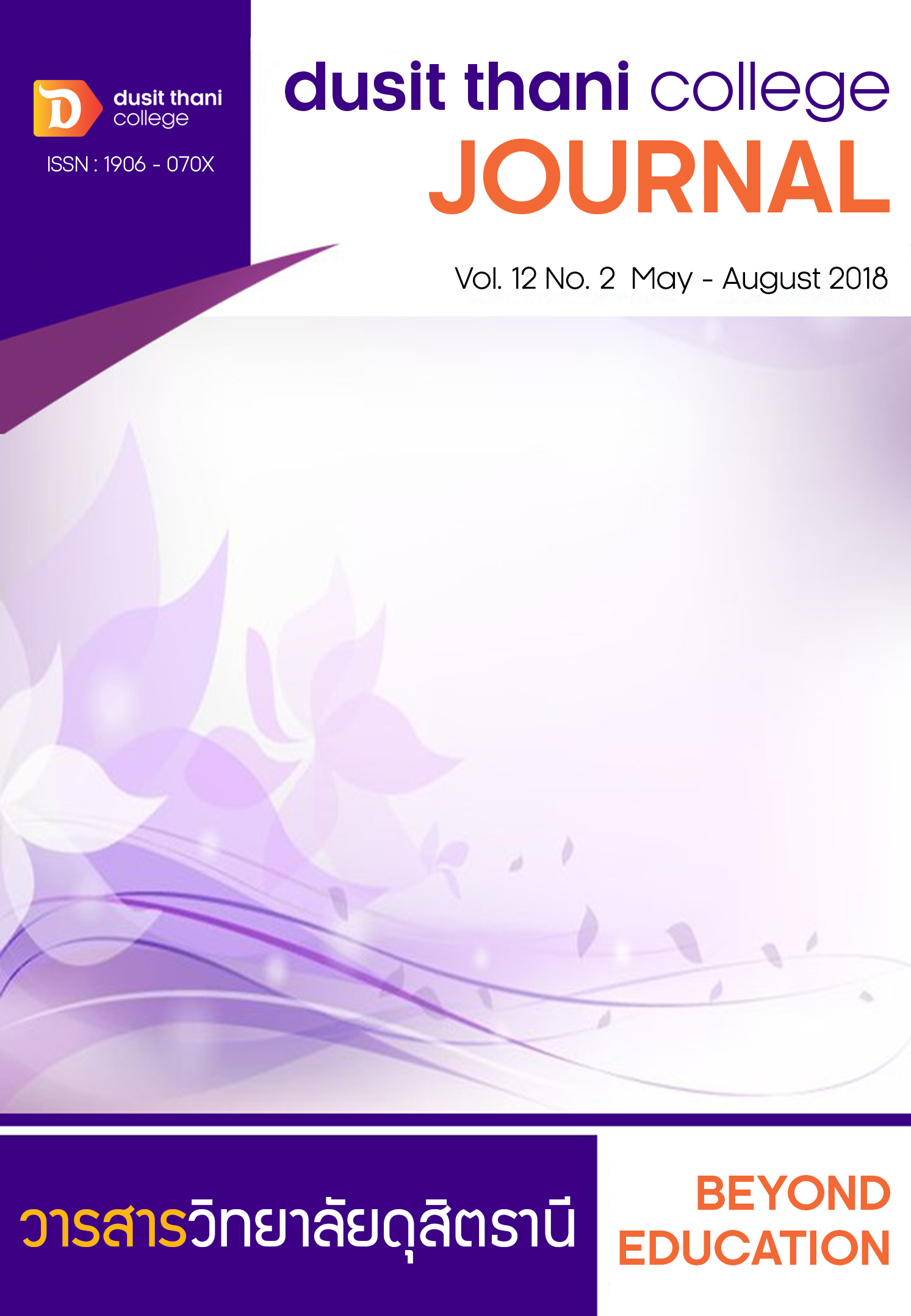The Development of Activities Enhance Characteristics Model Based on Concept Philosophy of Sufficiency Economy for Undergraduate Students
Main Article Content
Abstract
The purposes of this research were : 1) to study and fundamental data a model of activities to enhance characteristics; 2) to develop a model of activities to enhance characteristics; 3) to implement a model of activities to enhance characteristics; and 4) to evaluate a model of activities enhance characteristic. The samples were students in Silpakorn University, Kasetsart University and Nakhonpathom Rajabhat University. The research design was the two groups pretest-posttest for the experimental group of 30 students and a control group of 30 students. The research instruments were the direct interview form, the survey questionnaire, the knowledge test, the assessment form of moral, the assessment form of living skill, the assessment form of sufficiency economy characteristics, the follow-up operation form, the satisfaction questionnaire and the observation form.
The research results were :
- The model of activities to enhance characteristic based on the philosophy concept of sufficiency economy for undergraduate students (KM-LEDModel) comprised 5 steps : Knowledge (K), Moral (M), Living skill (L), Evaluation (E)and Dissemination (D). Each stage of the process had sub-stages which were : Plan : P, Doing : D, Check : C and Act : A. The component of the implementation condition included with social system support system, principle of reaction and success condition
- The evaluation a “KM-LED Model” of activities to enhance characteristic after the experiment was higher than before using the model in the statistics level at .05 included knowledge (=19.93,S.D.=4.12) moral ()=3.50,S.D.=0.34) living skill(=4.65, S.D.=0.29) characteristic of sufficiency (=3.74,S.D.=0.42) and follow-up operation (=4.65, S.D.=0.14). The six months follow up suggested that the sufficiency economy characteristic was at the highest level. (=4.65,S.D.=0.14)
- The satisfaction of the undergraduate students were at the highest level ()=4.67, S.D.=0.24)
Article Details
Article Screening Policy
- All research and academic articles to be published must be considered and screened by three peer reviews in the relevant field / article.
- All articles, texts, illustrations and tables published in the journal are the personal opinions of the authors. Editors don't always have to agree. And no responsibility whatsoever is the sole responsibility of the author.
- The articles to be published must never be published. Where did you first publish? And not in the consideration of other journals If the audit found that there has been a duplicate publication It is the sole responsibility of the author.
- Any article that the reader sees as being plagiarized or impersonated without reference. Or mislead the work of the author Please let the journal editor know it will be your greatest blessing.
References
Sufficiency Economy for Secondary School. Princess of Naradhiwas University
Journal, Vol5 No. 3 : September-December 2013.
Chickering A.W. and Reisser, Linda.(1993). Education and Identity 2nd ed. Sanfrancisco:
Jossey-Bass.
Issarangkul, Jirayu. (2009). “Following as Father : Sufficient Life to Sustainability,” Bangkok
: Petchrung-printing.
Kittikom Kaveerat. (2010). The Development of Experiential Learning Model for Health
Promotion of Rajabhat University Students. A Thesis Submitted in Partial Fulfillment
of the Requirement for the Degree Doctor of Philosophy Department of curriculum
and Instruction Graduate School, Silpakorn University.
Knowledge Network Institute of Thailand. (2011). Strategic and Operation, Retried : January 25, 2017
from https://www.knit.or.th/web/wp-content/uploads/2017/01/yearbook 2554.pdf
Ladawan Khumpha. (2012). Economic Development Strategy of Thailand under the National
Economic and Social Development Plan. Sukhothai Thammaythirat Open University
Journal of Economics, Vol 6 No 2: March 2, 2012.
Ministry of Education. (2016). Ministry of Education Announcement “The Basic Education
Approach for Quality Assurance in Education” October 11, 2016.
Office of the Education Council and Suandusitpoll. (2013). Family Survey Results Database.
Bangkok : Office of the Education Council and Suandusitpoll.
Office of the Higher Education Commission. (2013). Ministerial Regulations, Ministerial of
Education Commission about Rules/ Method and Guideline for Higher Education.
April 2011-July 2013, Type 1 Bangkok : Office of the Higher Education Commission.
Onsuda Jareanrath. (2012). The formation and Adaptation of Sufficiency-economy in Changing
Thai Context. Doctor of Education (Ed.D) Development Education, Srinakharinwirot
University.
Sophon Yamtongcome. (2012). The Development of A Teachers’ Characteristic Enhancement
Model of Government Teachers in the Scholarship Project of the Promotion of
Science and Mathematics Talented Teachers (PSMT). A Thesis Submitted in Partial
Fulfillment of the Requirement for the Degree Doctor of Philosophy Department of
curriculum and Instruction Graduate School, Silpakorn University.
Suriyon Labnongsang. (2012). Social-Thai Development to Asean Economics Community
2015. Journal of Education and Social Development, Vol 8 No.1: (May – October 2012).
The Subcommitee Ideal Graduate Network’s Thailand. (2017). Operation report of Ideal
Graduate Network’s Thailand. Bangkok : Kasatsart University.
Wiliamson, E.G. (1961). Student Personnel Services in College and Universities. New York:
McGraw-Hill.
Winaithorn Wichaidit. (2012). The Development of Geography Instruction Model to Enhance
Qualified Characterices of Undergraduate Students in Social Studies, A Thesis
Submitted in Partial Fulfillment of the Requirement for the Degree Doctor of Philosophy
Department of curriculum and Instruction Graduate School, Silpakorn University.


